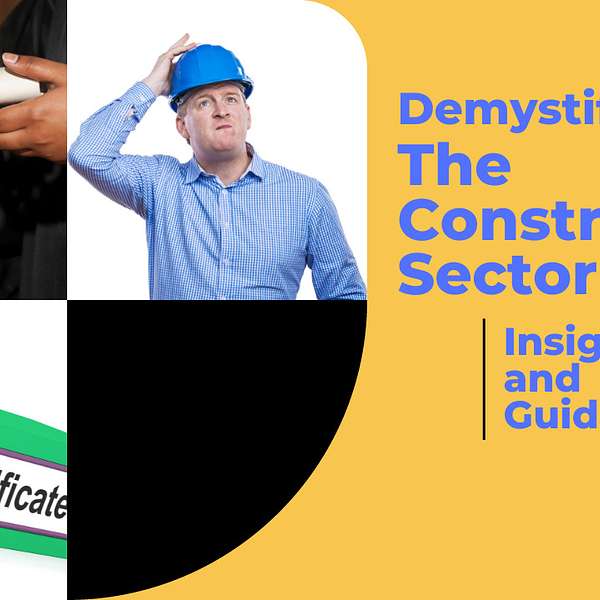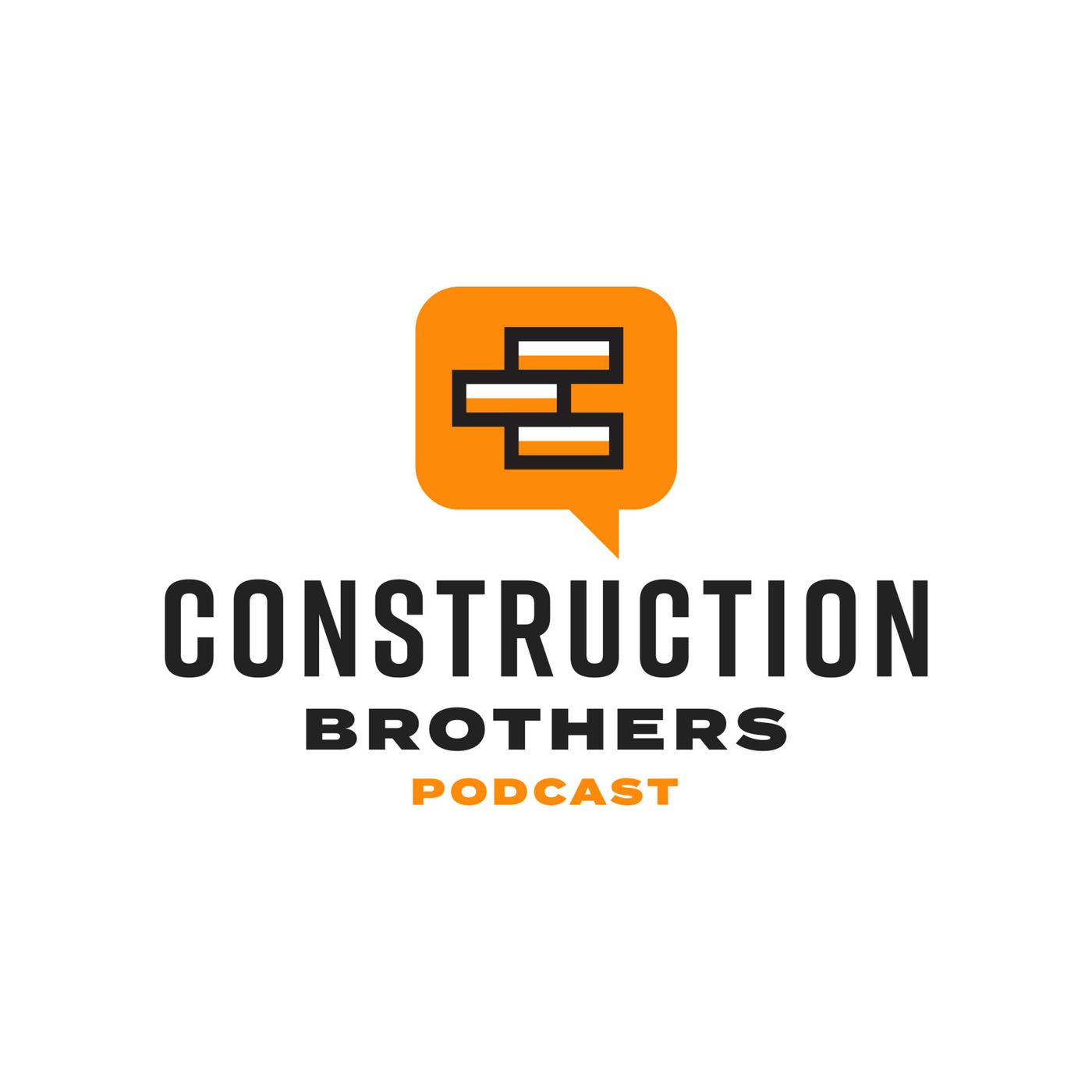
The Construction Veteran Podcast
Welcome to the Construction Veteran Podcast. This is a podcast connecting and celebrating veterans in construction, those who have the desire to be in the industry, and those who support them to create the built environment.
SUPPORT THE SHOW: https://www.paypal.com/donate/?hosted_button_id=M6ZMR2J2FVX4W
The Construction Veteran Podcast
Demystifying the Construction Sector: Insights and Guidance with Scott Friend, the Construction Veteran
Ever dreamt of building something beautiful, but feel lost in the construction industry's labyrinth of education and certifications? That's where Scott Friend, the Construction Veteran, steps in. In this engaging discussion, Scott breaks down the industry's complexities, offering crucial insights on why certain degrees or certifications might be essential for specific roles. Beyond that, he empowers listeners with the confidence to tread their unique paths — whether that's as an architect, engineer, or tradesperson.
Scott doesn’t stop at job titles. He goes on to share his philosophy of being a 'generalist,' emphasizing the value of broad industry understanding. He talks about the importance of safety certifications like first aid and CPR, and stresses the need to avoid unaccredited certifications. He highlights well-regarded certifications such as OSHA 10 and OSHA 30, offering tips on how to identify legitimate ones. Wrapping up the conversation, he shares his personal journey from studying religion to a 16-year career in construction. So, tune in as Scott helps you navigate the construction industry's vast seas, urging you to harness your time effectively and seek mentorship within the industry.
If you're a military veteran in the construction industry, or you're in the construction industry and support our military vets, and you'd like to be a guest on the podcast you can find me at constructionvetpodcast@gmail.com , or send me a message on LinkedIn. You can find me there at Scott Friend. Let's share the stories and motivate others!
Aerial Resupply CoffeeSupport and premium coffee for Americans, Veterans, and First Responders.
Benchmark Abrasives
Benchmark carries a complete line of flap discs, as well as blades and surface conditioning.
Memorial Ranch
Serving our veterans and first responders by providing a place of relaxation through resiliency.
Disclaimer: This post contains affiliate links. If you make a purchase, I may receive a commission at no extra cost to you.
- TCV Email: constructionvetpodcast@gmail.com
- TCV YouTube: https://www.youtube.com/@constructionvet/featured
- TCV Instagram: https://www.instagram.com/constructionvetpodcast/
Welcome back to the Construction Veteran. I'm Scott Friend, and today we're going to talk about growing your noggin. So what do I mean by that? Let's talk about education and certifications in the industry. So I've talked previously about why you might need a degree or certain certifications to get a certain job. So let's expand on that. So let's say you want to be a designer Well, do you want to be an architect, an engineer? You have to go to school for that. Let's say you want to get into a trade, you have to go to a trade school.
Speaker 1:But even further than that, within the industry, there are many, many, many certifications, depending on what you're doing and how specific you want to get with your niche. Now my suggestion be a generalist. What I mean by that is no, I'm not just saying this because I work for a general contractor, but what I mean is having some information about a lot of the industry will really help you out. I still want you to key in on what you want to do. So if you want to seek out a certain certification and you want to be the technical expert on that, go do it. I'm the last guy to tell you that you should not seek out what you want to do. What I want you to be careful about, though, is there's a lot of companies out there that might pitch to you that their certification is the best or this is the only certification. For this, do your research, just like with colleges that need to be accredited, you need to make sure that these certifications that you want to seek out and achieve are also accredited by an industry-recognized body. Let me give you an example. So a lot of people want to get their OSHA 10, osha 30, and by that I mean a 10-hour training or 30-hour training, or even further into the 500 or more. Osha is obviously a nationally recognized organization that's going to back their claims. They're the best of the best in the industry right now. So when you see a big name like that OSHA, aia, usgbc these are well known within the industry, so you could probably trust them when you get these certifications.
Speaker 1:If you're Googling random certifications and their website kind of looks like a mom-and-pop shop probably not the best deal, but there's some hidden gems out there. There's new certifications coming out all the time. Your best bet is finding a mentor within the industry and seeing what they have, finding somebody in a position in their career, that they've gotten to the point that maybe you want to get to, and look at that and see, hey, what certifications do they have? Look them up on LinkedIn, find out where you know. What did they study in school? What are the certifications they have? Lots of people have all these letters and acronyms behind their names. What does that mean? What are they certified in? It might be something that you're interested in.
Speaker 1:I'm not going to sit here and tell you guys what you should get your certifications in. I will say, though, you should look at some basics. What I mean by that is look at safety certifications, things like first aid, cpr. Every company wants to see these things, but if you're going to be specialized, be very careful and I'm not trying to frighten you and say, be very careful that you know the industry's all bad and there's people out there trying to take your money, which that's in any industry, right. But what I mean again, do the research on the certifications Figure out? Is this legit? Is this something I want to look up? But I could always stress that I think the fundamentals that people need to have is first aid and CPR and, at a minimum, osha 10. Any company is going to appreciate that, regardless of if you're going to become a superintendent, project engineer, project manager, any of those things, these are just kind of the basics that you want to have. Now I'm on my kids trampoline, why? Because it's my YouTube and I can choose what I want to do. So, anyway, you guys can look into all kinds of stuff.
Speaker 1:When it comes to education, if you're going to get into construction specifically, I would suggest looking at construction management, construction science. Guarantee that the school that you go to has something similar to that that you can get involved in. That's Coco, one of our breeder rabbits, anyway. So you know, obviously, if you want to go into architecture, there's going to be a degree for that. It's pretty obvious when you're searching for these degree programs or engineering. What a lot of people don't know, though, anyway, what a lot of people don't know or don't really talk about, is man, I've had people I've worked with that are have an architectural degree and working construction management, have a finance degree, economics Not like I'm shooting a video or anything, right, but I would say that your opportunities getting into the industry, at least on the construction management side, are going to be a lot easier, regardless of what degree you have, then if you go into some sort of design path, because that's very specific, they're looking for very specific things.
Speaker 1:I've said before there's people I've worked with that have no degree. I've also said, you know, my undergrad is in religion, my master's is in divinity, but I've been in this industry for now If you count my time in the service about 16 years. But it's really the people and the relationships that have made me successful personally. So, man, I would say, don't really focus on a lot of that stuff right now, certifications especially. But if you want to, especially if you're still in, look at first aid, cpr and any kind of OSHA training that you can get. I guess what I'm getting at with all this is use your time wisely.
Speaker 1:I don't want you guys to make the same mistake I did. I didn't know what I wanted to do with my degree I mentioned in the past. I switched like five times. I've gone and pursued different types of certifications. You know I waste a lot of time and money figuring that out.
Speaker 1:I don't want you to make the same mistake. So if you're not sure what you want to pursue, feel free to reach out to me First. We're going to figure out what is it that you want to do within the industry? Maybe you don't know, and I can try to help you get connected with other people in the industry that have similar mindsets, similar goals and aspirations, but I don't want you wasting the most valuable resource that you have and that's your time. So thanks again for tuning in. I appreciate it If you would subscribe. Thank you so much Again. I want to put out also that I recently put out an ebook it's only $2.99 right now on Amazon. Pretty quick read just to talk to you about the different facets of the industry, how easy it is to get into it, and then you know, hopefully it helps you out while you transition, if you're coming from the military, into the industry. Thanks again, guys, and good luck.
Podcasts we love
Check out these other fine podcasts recommended by us, not an algorithm.

Arc Junkies
Jason Becker
Dirty and Driven
James Devinney
Construction Brothers
Construction Brothers
The Handyman Startup Podcast
Dan Perry: Handyman | Small Business Owner
Elevate Construction
Jason Schroeder
